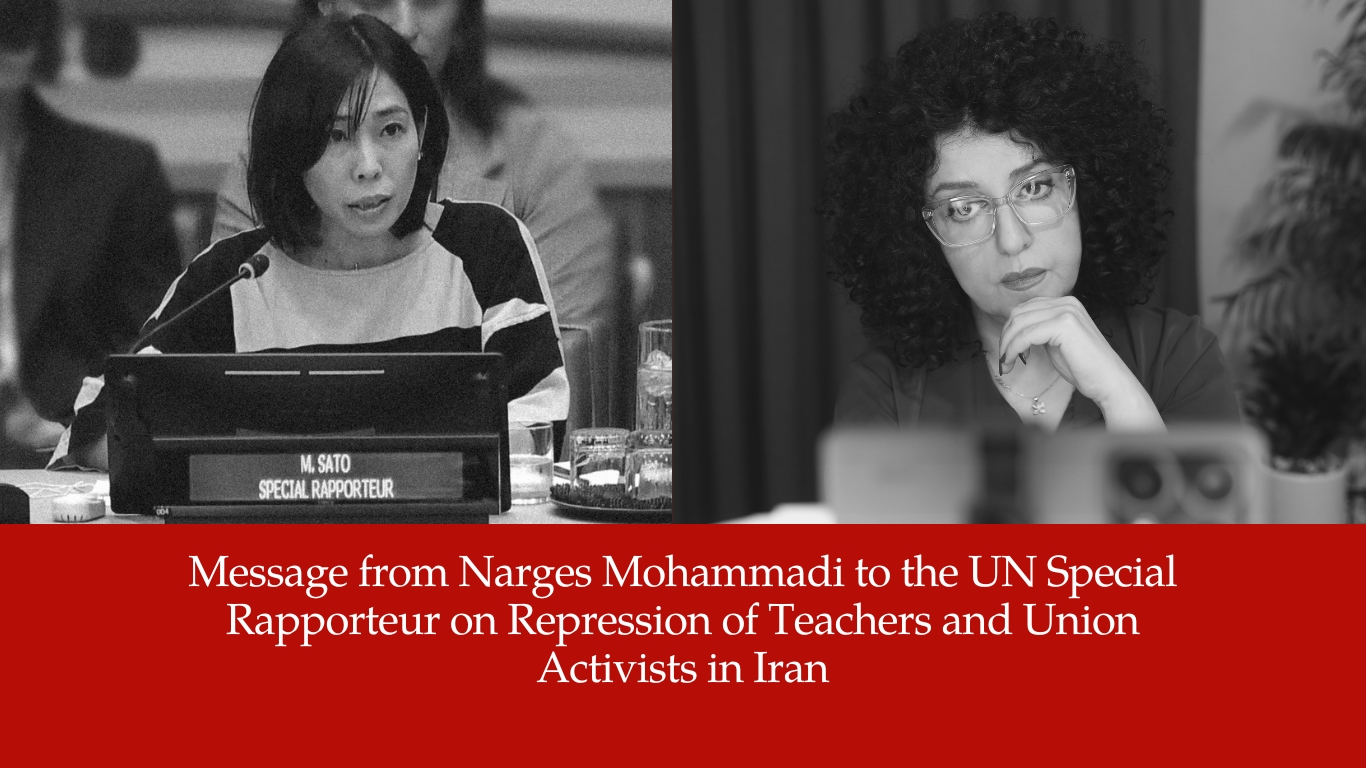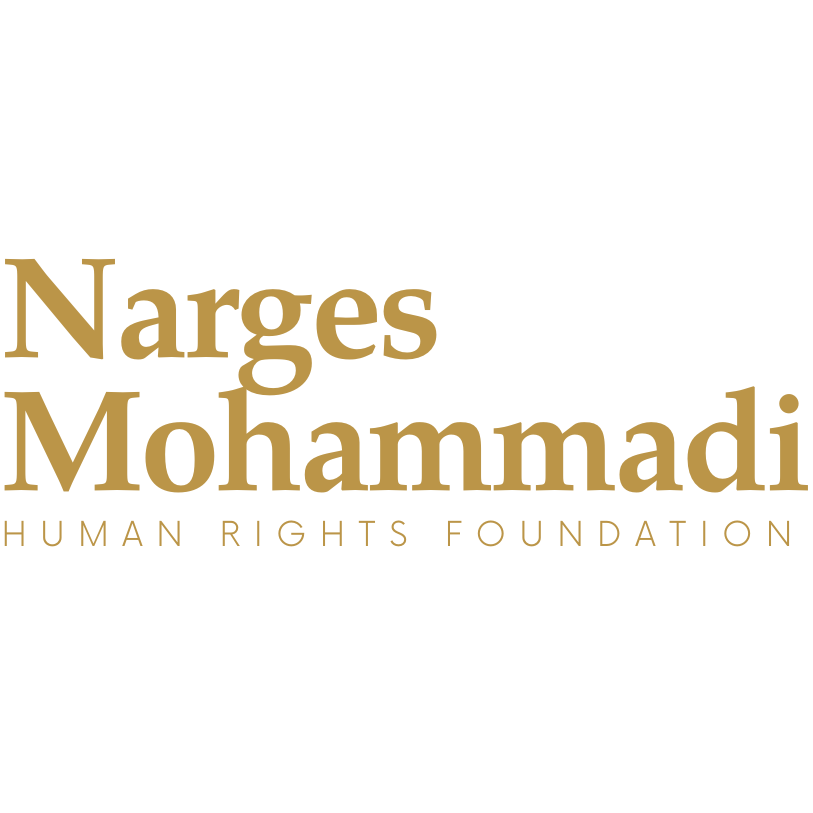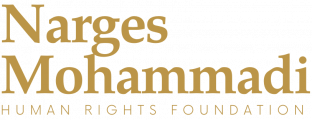
Narges Mohammadi’s Letter on Human Rights Violations Against Teachers in Iran
Message from Narges Mohammadi to the UN Special Rapporteur on Iran – 5th Sep 2025
Paris – Nobel Peace Prize laureate Narges Mohammadi has issued a letter to Mai Sato, United Nations Special Rapporteur on the situation of human rights in the Islamic Republic of Iran, denouncing the escalating crackdown on teachers and union activists across the country, particularly in Kurdistan.
Here is her full message:
To the Honorable United Nations Special Rapporteur on the situation of human rights in the Islamic Republic of Iran,
Mrs. Mai Sato,
Since the 1979 revolution and the establishment of the Islamic Republic, the professional and union activities of teachers in Iran have consistently faced severe repression under every government.
If we consider the new wave of teachers’ union activity as beginning in the late 1990s—after the bloody suppression of the 1980s and the closure of all political and civic activism avenues—the first major crackdown occurred in those same years under the so-called Reformist government.
This repression has continued under every subsequent administration—including the current one headed by Masoud Pezeshkian.
The peak of these crackdowns occurred during Ebrahim Raisi’s presidency, especially following the “Woman, Life, Freedom” movement, when hundreds of teachers’ union activists were arrested and imprisoned. According to a Ministry of Education official, more than 300 teachers, union activists, and teacher-training students were subjected to dismissal or permanent suspension.
The continuation of such repressive measures under the Pezeshkian administration—most recently with the issuance of harsh dismissal, suspension, and forced retirement orders targeting sixteen teachers across various cities in Kurdistan in the past week—represents a stark illustration of the regime’s intensified violence against the Iranian people, particularly marginalized populations in regions such as Kurdistan. It also reflects the regime’s ongoing effort to silence independent voices. The Islamic Republic continues, with ruthless cruelty, to suppress any form of independent professional, civic, or political activity—responding to even the slightest sign of peaceful protest with the harshest tools of repression and intimidation, while denying any legitimacy to the people’s voices.
The issuance of dismissal, suspension, forced retirement, and exile orders for Somayeh Akhtarshomar, Majid Karimi, Ghiyas Nemati, Kaveh Mohammadzadeh, Omid Shahmohammadi, Hiwa Qureshi, Parviz Ahsani, Jahangir Bahmani, Nasrin Karimi, Leila Zarei, Soleiman Abdi, Loghman Allahmoradi, Salah Hajimirzaei, Shahram Karimi, Leila Salimi, and Faisal Nouri—close to the anniversary of the Jina/Mahsa movement—reveals the regime’s heightened fear of another uprising by the Iranian people demanding democratic reforms and social justice.
I strongly protest the ongoing repression of teachers and call on all human rights organizations and international bodies to express solidarity with educators and union activists, denounce these security and judicial measures, and help prevent the continuation of escalating repression against trade-union and civic activists in Iran.
I also specifically appeal to UNESCO and the International Labour Organization to bar officials from Iran’s Ministry of Education and Ministry of Labour from participating in their international assemblies.
It is the duty of international and human rights institutions to exert pressure on the Islamic Republic to revoke its unjust rulings against all teachers—especially those in Kurdistan.
Narges Mohammadi
5 September 2025
گزارشگر محترم ویژه حقوق بشر سازمان ملل متحد
سرکار خانم مای ساتو
فعالیتهای صنفی معلمان پس از انقلاب ۵۷ و استقرار حکومت جمهوری اسلامی در همه دورهها و دولتها تحت شدیدترین سرکوبها قرار داشته است.
اگر آغاز دوره جدید فعالیتهای صنفی معلمان را پس از سرکوبهای خونین دهه شصت و انسداد تمام مجراهای فضای کنشگری سیاسی و مدنی، اواخر دهه هفتاد در نظر بگیریم، اولین سرکوب گسترده نیز در همان سالها و در دولت اصلاحات اتفاق افتاد.
سرکوبی که در همه دولتهای پس از آن و در همین دولت اخیر، مسعود پزشکیان، هم ادامه یافته است.
اوج این سرکوبها در دولت رییسی و بویژه پس از جنبش « زن، زندگی، آزادی» اتفاق افتاد، و صدها فعال صنفی معلمان بازداشت و روانه زندان ها شدند؛ به گفته یک مقام مسئول در آموزش و پرورش بیش از سیصد معلم، فعال صنفی و دانشجوی فرهنگیان با احکام اخراج و انفصال مواجه شدند.
تداوم این سرکوبها در دولت پزشکیان با احکام سنگین اخراج، انفصال و بازنشستگی اجباری شانزده معلم در شهرهای مختلف کردستان در هفتهی گذشته، نماد بارز خشونت مضاعف علیه مردم ایران به ویژه مردم به حاشیه رانده شده، از جمله در کردستان، و همچنین تلاش نظام برای نابودی صدای مستقل آنهاست. حکومت جمهوری اسلامی همچنان با قساوتی بیرحمانه، هر گونه تلاش صنفی، مدنی و سیاسی مستقل را سرکوب میکند و حتی کوچکترین نشانهی اعتراض مسالمتآمیز را با بدترین ابزارهای سرکوب و ارعاب پاسخ میدهد، بیآنکه هیچ حق و مشروعیتی برای صدای مردم به رسمیت بشناسد.
صدور احکام انفصال، اخراج، تعلیق، و بازنشستگی اجباری و تبعید برای
#سمیه_اخترشمار #مجید_کریمی #غیاث_نعمتی #کاوه_محمدزاده #امید_شاەمحمدی #هیوا_قریشی #پرویز_احسنی #جهانگیر_بهمنی #نسرین_کریمی #لیلا_زارعی #سلیمان_عبدی #لقمان_اللهمرادی #صلاح_حاجیمیرزایی #شهرام_کریمی #لیلا_سلیمی #فیصل_نوری
در آستانه سالگرد جنبش ژینا/مهسا ، نشان میدهد که جمهوری اسلامی به شدت نگران خیزش دوباره مردم ایران برای تحقق خواستههای دمکراتیک و عدالتطلبانه خود میباشد.
ضمن اعتراض شدید نسبت به تداوم سرکوب معلمان، از همه نهادهای حقوق بشری و مجامع بینالمللی میخواهم که با اعلام همبستگی با معلمان و فعالان صنفی معلم و محکومیت برخوردهای امنیتی و قضایی، مانع از تداوم سرکوبهای در حال افزایش فعالان صنفی و اجتماعی در ایران شوند.
همچنین به صورت ویژه از سازمان یونسکو و سازمان جهانی کار در خواست میکنم که مانع از حضور مسئولان آموزش و پرورش و وزارت کار در اجلاسهای این دو سازمان جهانی شوند.
وظیفه نهادهای بینالمللی و حقوق بشری است که جمهوری اسلامی را برای لغو احکام ظالمانه علیه همه معلمان، بهویژه معلمان کردستان تحت فشار قرار دهند.
نرگس محمدی
۱۴ شهریور ۱۴۰۴


